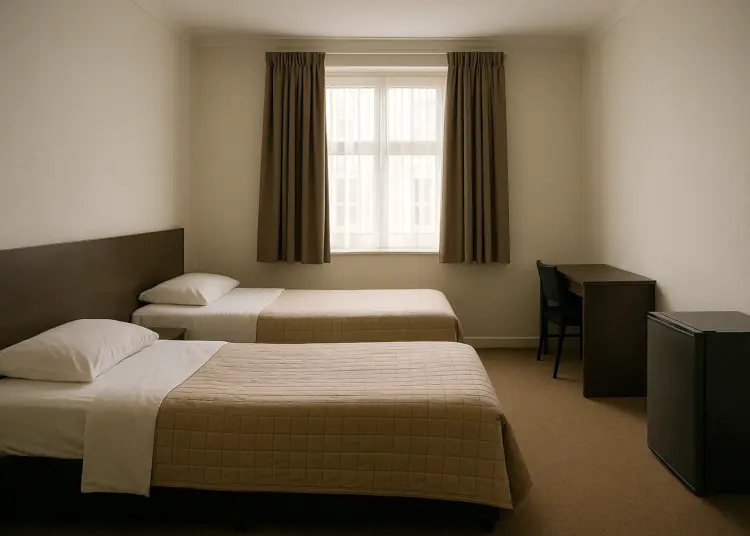Story Highlight
– Two charities sue Home Office over migrant hotel conditions.
– Survivors of trauma live in “prison-like” accommodations.
– Policy changes force vulnerable individuals to share rooms.
– Home Office criticized for not consulting stakeholders.
– Human rights laws may be overhauled for deportations.
Full Story
Two organisations advocating for the rights of asylum seekers are launching legal action against the Home Office. These charities, the Helen Bamber Foundation and Freedom from Torture, have raised serious concerns regarding the conditions in which vulnerable migrants are housed, particularly highlighting the practice of placing survivors of trafficking and torture in a shared hotel accommodation that they describe as “prison-like.”
The core of the legal challenge focuses on modifications to asylum accommodation policies, which the charities argue have exacerbated the risk of harm to individuals who have already suffered extreme violence and exploitation. The claim is set to be heard over two days this week, as the organisations seek to contest a lack of consultation regarding changes that critics assert undermine the safety and wellbeing of survivors.
According to the charities, government measures enacted at the beginning of 2024 have created an environment where individuals are compelled to share their living spaces with unfamiliar people, further endangering those recovering from trauma. They contend that this policy shift has effectively stripped them of previously granted exemptions which were meant to protect survivors from being placed in such distressing situations.
In a statement from the Helen Bamber Foundation, representatives have voiced the plight of those seeking refuge, stating, “Trafficking and torture survivors who come to the UK to find protection have fled some of the worst forms of human cruelty. They are often traumatised, isolated and at high risk of being exploited again.” The foundation also emphasised the critical need for a sense of safety as part of the recovery process from such profound trauma, a necessity which is jeopardised by current accommodation policies.
Survivors have also spoken out regarding the severe impact of these arrangements on their mental health. Jacob, a torture survivor from Eritrea, shared his distressing experiences, expressing a consistent fear of being forced to share living spaces once more. “I would rather move outside London than be in a room again with strangers,” he recounted, referring to the traumatic memories that resurfaced during his time in shared accommodations. Living with a constant sense of danger, Jacob described the effect on his wellbeing, stating, “I couldn’t sleep, I was triggered because I felt unsafe.”
The Helen Bamber Foundation attempted to advocate on Jacob’s behalf to secure him a private room due to his severe post-traumatic stress disorder (PTSD), but their request was denied. Although hotel staff have since informed him that no additional occupants would be joining him in his room, the lingering anxiety continues to haunt him.
Prior to these changes, there existed a protective guideline that necessitated exemptions for individuals with histories of severe abuse, including torture victims, trafficking survivors, and those with disabilities. However, advocates allege that the recent alterations to the Allocation of Asylum Accommodation policy were implemented abruptly and without adequate notification, fundamentally altering the guidelines that dictate where and how asylum seekers receive housing during their application process.
A revised version of the accommodation policy was issued by the Home Office in June, retaining elements that the charities have labelled as harmful and “unlawful.” Both the Helen Bamber Foundation and Freedom from Torture assert that Home Secretary Shabana Mahmood has violated her obligation to consult with relevant stakeholders, failing to properly evaluate the implications of the alterations on the affected populations.
Mwa Mbuyi Kapinga, a torture survivor originally from the Democratic Republic of Congo, expressed her dismay at the systemic neglect of individual circumstances by authorities. Her own experience, which involved living in asylum accommodation for over seven years, saw her share space with multiple individuals, often leading to severely distressing situations. She recounted how lack of proper facilities and privacy hindered her basic needs, leaving her vulnerable to re-traumatisation and feelings of hopelessness. “You feel like you are on the edge,” she stated, reflecting on the mental toll of such living conditions.
Critics point to the dire consequences stemming from the inadequate management of asylum resources. Natasha Tsangarides, the Associate Director of Advocacy at Freedom from Torture, lamented, “The previous government allowed an unforgivable crisis to develop in asylum accommodation, and survivors of torture and trauma are paying the price.” She advocated for urgent reforms to the accommodation system, calling on government leaders to heed the voices of those with expertise in this field and to provide safe and humane housing solutions for those seeking sanctuary in the UK.
The latest push for reform comes amidst a broader context of increasing scrutiny directed at the government’s approach to immigration and asylum policy. Home Secretary Shabana Mahmood recently unveiled ambitious plans aimed at overhauling the UK asylum framework, with potential changes to human rights laws intended to facilitate expedited deportations of individuals deemed unsuitable for asylum.
As the legal case unfolds, there remains a mounting call for attention to the welfare of asylum seekers who have already endured significant trauma. The forthcoming hearings are set to serve as a critical juncture for the Home Office’s treatment of some of the most vulnerable individuals in society and the standards to which they are held. The situation underscores the pressing need for a humane response to the asylum accommodation crisis, prioritising the safety and dignity of those seeking refuge in the UK.
Our Thoughts
The situation described highlights several key failures in the management of asylum accommodation that could have been avoided to protect vulnerable individuals. Notably, a clear breach of the Health and Safety at Work Act 1974 is evident, as the Home Office has not ensured a safe working environment for staff or a safe living environment for residents, which includes adequate housing conditions to support mental health. The lack of consultation with relevant charities represents a failure to consider the specific needs of trauma survivors, contravening the requirement for risk assessments under the Management of Health and Safety at Work Regulations 1999.
To prevent similar incidents in the future, there should be mandatory assessments of housing arrangements for asylum seekers, focusing on the psychological and physical safety of individuals, particularly those with trauma backgrounds. Additionally, policies must ensure that vulnerable populations are not subjected to conditions that could exacerbate their trauma. Engaging with charity organizations like the Helen Bamber Foundation could provide insights into creating more suitable accommodations. Implementing training for staff on the specific needs of these individuals could also enhance safety and well-being.






















